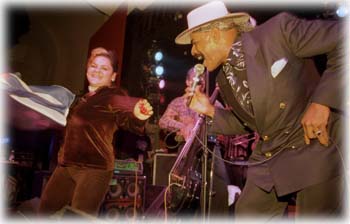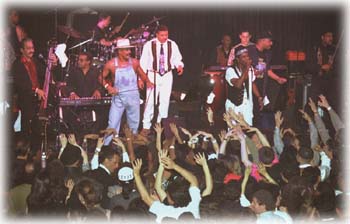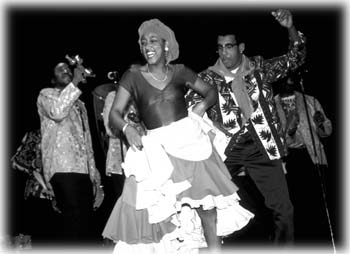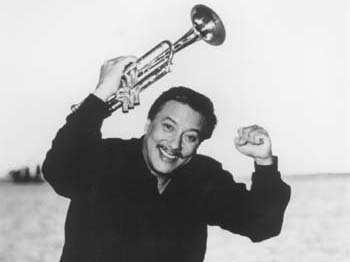![[MetroActive Music]](/music/gifs/music468.gif)
![[MetroActive Music]](/music/gifs/music468.gif)
[ Music Index | Metro Santa Cruz | MetroActive Central | Archives ]
Band in the USA
Fire Dance: Los Van Van vocalist Pedrito Calvo and an enthusiastic member of the audience sizzle on stage, igniting the crowd with the Cuban band's 'songo' heat.
Despite U.S.-generated red tape, Los Van Van, Cuba's most popular musical group, headlines SC's Cocoanut Grove
By Ellen Farmer
WHERE HAS LOS VAN VAN BEEN all our lives? And why is Cuba's most popular salsa band, which performed in the U.S.--San Francisco, to be exact--last January for the first time in 27 years, playing the Cocoanut Grove next Monday night? And how did we get along without these guys for so long?
Basically, because we had to. While Los Van Van has played to enthusiastic audiences around the globe, strict travel and trade restrictions have barred these Cuban citizens from creating Cuban music on U.S. soil. But it was not until Santa Cruz and Bay Area producers decided to spend enormous numbers of hours dealing with paperwork and arrangements that local music lovers could join the international party.
And quite a party it seems to be.
Los Van Van has recorded 16 records and is the most popular band on Cuban radio. The group is known worldwide for live shows that feature improvised call and response between musicians and dancing audiences.
Band leader Juan Formell even created Los Van Van's signature songo style, which opens the traditional Afro-Cuban rhythmic dance son to improvisation.
"The relationship between the improvisers on the dance floor and those on the bandstand guarantees that the music holds to especially high standards," says the New York Times' Peter Watrous. "Los Van Van mixes the sound of the violin and trombones with the standard modern Afro-Cuban rhythm section. Improvisations by the lead singers drift in and out between the sharp attack of riffs."
Like Celia Cruz, Desi Arnaz and others before them, the musicians from Los Van Van also imbue their festive sound with references to the Santería religion, where the songo's rhythms began.
Ever wonder why Arnaz's character Ricky Ricardo yells "babaloo" on the I Love Lucy show? The big band backdrop Arnez used for his congas nearly obliterated the fact that he was welcoming "Babalú-Ayé," the Santería god of healing and fortitude.
"[Los Van Van's] songs take on the subject of women, the power of the Santería religion, and the necessity of the Saturday night party in troubled times," says Watrous. "But mostly it's a feeling. Hearing Los Van Van is like running across your identical twin who has been taken away at birth and sent halfway around the world to be raised."
Hands Across the Seas: Cuba's spice rockers in Los Van Van make their way into the U.S., the Cocoanut Grove to be exact, for a night of fun-lovin' and dancing.
Got to Dance to Play
A NEW WAVE OF CUBAN musicians started coming to Santa Cruz last summer when Chucho Valdez brought his jazz ensemble, Irakere, to Kuumbwa. Valdez is a very big man with very big hands and lightning-fast runs and trills. His percussion section was nothing short of flat-out gifted. And Tim Jackson, who's been booking these bands for Kuumbwa, says that Cubanismo, which played Kuumbwa in April, was even tighter.
So what makes Cuban music so hot?
"Schools," says Gil Rubio, who features contemporary as well as folkloric Cuban classics on his Friday evening Latin jazz show on radio KAZU (90.3 FM).
"It seems that because of the free national music schools," says the DJ, "Cuban musicians have been able to focus on practice and innovation without the distraction of keeping their day jobs. Their musicianship excels because of these schools."
Greater Bay Area musicians John Santos, Carolyn Brandy, Rebeca Mauleón and others have deepened their considerable talents by studying with the Cuban masters, bringing an exciting array of percussion and keyboard styles to Santa Cruz at Jazz Camp West and Kuumbwa classes, among others.
"Because so many Cuban people don't have things like television, music is a predominant cultural force--it's much more participatory," says Peter Wilde, bass player for local group Charanga Nueve.
Wilde notes the integration of dance within musical instruction, adding, "As a musician, you have to learn to dance it in order to play it," he says. (By the way--the rumba, mambo and chacha, just to name a few, were all developed by Cubans.)
In fact, it was because of the enthusiasm of U.S. drum and dance students that the Muñequitos de Matanzas made its historic tour of the U.S. a few years ago.
As folkloric musicians on a cultural exchange, the members of Muñequito performed their rendition of tributes to Elegguá, Yemayá, Oshún, Oggún, Changó--the pantheon of Yoruba gods from a religious tradition thousands of years old--accompanied by a special Cuban Santería blend of African drumming and dancing.
Isabel Velez, a UCSC grad student from Puerto Rico, is a fan of the entire body of sounds emanating from the area. She explains that Caribbean music has a way of translating to many different kinds of people. The very idea of this music is to get people together and create large, memorable public events.
"I carry the sound of the clave within me, even in Santa Cruz," she says. "And when I hear it in the distance, on somebody's car radio or emanating from a club, my whole being starts to move in a certain way.
"And," she adds with passion, " I feel at home and alive."
Hot Enough to Handle: Members of Muñequitos de Matanzas let loose with renditions of Cuban folkloric songs, as well as a heady mix of African drum and dance.
Petty Contretemps
CUBAN/U.S. RELATIONS are filled with irony lately as the Cold War fades and both nations face the 21st century. Cultural exchanges go on in spite of politics, but not without hassles. For example, in May 1990, three-time Grammy winner Arturo Sandoval, a jazz trumpeter and Cuban defector, was granted political asylum with his family at the U.S. embassy in Athens.
By July of that year, Sandoval had obtained permanent-residence papers. Soon after, he began a professorship at Florida International University and continued to perform widely. He even played the Super Bowl and a Clinton inauguration party last January. But this April, he was denied U.S. citizenship on a technicality.
There seems to be an awareness on the part of music producers that it's time for a contemporary reality check. Both Kuumbwa and Bill Graham Presents have decided to sponsor touring Cuban musicians simply to expose Californians to popular bands.
Up until now, producers and musicians alike were unwilling to take the financial risk involved in booking a U.S. tour. Visas could be denied at the last minute by the U.S. government after publicity campaigns had been mounted and concert tickets sold.
Why has this changed?
"The caliber of the musicians is mind-boggling," says Danny Scher of Bill Graham Presents. "In fact, we're not making any money, and we're not allowed to pay the musicians, but vale la pena (it's worth the effort).
"This year we decided to go through the quixotic, unpredictable process with all its twists and turns because we get juiced exposing the American people to this incredible music," explains Scher, who in recent years has spent much time in Cuba. "I've taken my kids. They've become friends with the Los Van Van kids. In fact, the day after their Hollywood Bowl appearance, we're taking the whole band to Disneyland."
Culture and Capitalism
CULTURAL EXCHANGE and deepening friendships will provide the profound shift in consciousness to move U.S./Cuban relations forward. The mystique and silence around Cuban affairs has been going on for nearly 40 years.
Factions in the U.S. government, led by Jesse Helms, continue to tighten the screws on their hardline stance against Fidel Castro and Cuba's Communists.
"What the U.S. is doing is shameful," Wilde says. "Because so few of us know firsthand what the Cubans are facing, our enjoyment of the music is shallow unless we find more information."
"They just don't get it," says Newsweek Interactive picture editor Cynthia Carris, who has spent a great deal of time in Cuba with her Cuban husband. "You can't change Cuba with an embargo. A more effective way to deflate Castro's power is to encourage capitalism."
It appears that Castro, for his part, has taken great pleasure in showing the U.S. that he could provide a better life for the Cuban people than what they had earlier in the century while dependent on U.S. tourism.
In fact, one of the first acts of the revolutionary government in 1959 was to reeducate hundreds of prostitutes and offer them jobs as clerks, bus drivers and waitresses, according to Coco Fusco, writing in the September/October 1996 issues of Ms.
Fusco is a writer and artist whose Cuban mother was deported from this country in 1959. Mom managed to hide out long enough to have baby Coco on U.S. soil, thereby securing U.S. citizenship for the child and many other family members. According to Fusco, "to lure foreigners [to Cuba], the government is showcasing 'traditional' Afro-Cuban religious rituals and art, 'traditional' Cuban music, and, of course, Afro-Cuban women."
A throwback, perhaps, to lucrative Prohibition days, when Cuba became the nightclub playground of the East Coast?
Maybe so, but the idea is none too popular among the Cubans themselves. Today many Cubans want "a modern society with a diversified economy," writes Fusco, "no longer having to service a First World lust for exotica."
It seems a Los Van Van concert is just that--an opportunity for American dancers to get out there and feel the songo with no exploitation involved. The mystique surrounding this music--including the lure of forbidden fruit provided by both governments' stubborn travel and trade restrictions--makes the discovery of Cuban music by West Coast fans a treasure hunt.
Get out your tight little dresses and form-fitting pants, because the salseros are coming--and those who want to discover musical gold will be there.
Copyright © Metro Publishing Inc. Maintained by Boulevards New Media.

Max Ramirez/Latino Link
Max Ramirez/Latino Link
Cynthia Carris
Freedom Road-block: Internationally acclaimed musician and Cuban defector Arturo Sandoval played the Clinton inaugural and the Super Bowl but was denied citizenship by the U.S. government.
Los Van Van performs Monday (9pm) at the Cocoanut Grove, 400 Beach St., Santa Cruz. Afro-Cuban dance lessons kick off the evening at 8pm (doors open at 7:30pm). Tickets cost $21 at the door, $18.90 in advance. For more information, call 423-2053.
From the June 19-25, 1997 issue of Metro Santa Cruz.